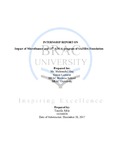| dc.contributor.advisor | Haq, Mahmudul | |
| dc.contributor.author | Afrin, Tanzila | |
| dc.date.accessioned | 2018-02-06T06:46:39Z | |
| dc.date.available | 2018-02-06T06:46:39Z | |
| dc.date.copyright | 2017 | |
| dc.date.issued | 2017-12-20 | |
| dc.identifier.other | ID 14164038 | |
| dc.identifier.uri | http://hdl.handle.net/10361/9401 | |
| dc.description | This internship report is submitted in a partial fulfilment of the requirements for the degree of Masters of Business Administration, 2017. | en_US |
| dc.description | Cataloged from PDF version of internship report. | |
| dc.description | Includes bibliographical references (page 42). | |
| dc.description.abstract | For millions of poor and extreme poor in Bangladesh, a small loan that required no collateral or documentation, and that was available in the absence of any formal financial support, played a major part in lifting them out of abject poverty. This small loan has played a big role in transforming and saving lives, building leaders, ensuring the education of children, and enabling millions of marginalized and poverty-stricken individuals and families to survive against formidable odds. The Microfinance industry, now valued at BDT 626 billion benefits over 2.5 million people in the country, according to a World Bank estimate in September 2016. SAJIDA Foundation’s microfinance program which started in 1993 operates on the principles of quality, integrity, innovation and transparency. The program now has 188 microfinance branches in 20 districts with a cumulative recovery rate of 99.74% (with a self-sufficiency level of 121%) and is able to serve 245,539 members with different kinds of loans. Through a partnership with the PalliKarmiSahayak Foundation (PKSF), the program has progressed significantly and looks towards the future with further plans for growth. With its progressive and inclusive approach, SAJIDA’s microfinance has taken great strides in poverty alleviation, focusing increasingly on innovative solutions and usage of technology at all levels while ensuring a quality of services provided. As the program continues to expand, building on research and knowledge, it continues to prioritize the needs of its beneficiaries, with concerted efforts to build on member services, evolving into a more formalized financial institution and stepping towards international development. | en_US |
| dc.description.statementofresponsibility | Tanzila Afrin | |
| dc.format.extent | 42 pages | |
| dc.language.iso | en | en_US |
| dc.publisher | BRAC University | en_US |
| dc.rights | BRAC University Internship reports are protected by copyright. They may be viewed from this source for any purpose, but reproduction or distribution in any format is prohibited without written permission. | |
| dc.subject | SAJIDA Foundation | en_US |
| dc.subject | Microfinance program | en_US |
| dc.title | Impact of microfinance and 13th (CMA) program of SAJIDA Foundation | en_US |
| dc.type | Internship report | en_US |
| dc.contributor.department | BRAC Business School, BRAC University | |
| dc.description.degree | M. Business Administration | |

